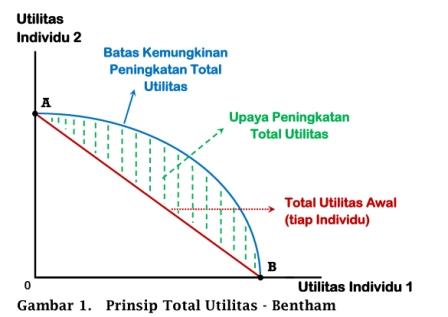Concepts of Utilitarianism, Liberalism, Libertarianism, and Socialism in Economic Policy Determination.
Determination of economic policy is a classic problem that has always been a debate. The question of what policies the government should implement regarding equitable distribution of social welfare often raises pros and cons. In this paper, we will study the basic concepts that become the reference in determining policy, namely utilitarianism ( utilitarianism ), liberalism ( libertarianism ), libertarianism ( libertarianism ), and socialism ( socialism ).
Previously, it should be noted that these concepts are multidisciplinary in nature, from the perspectives of politics, ethics, law, economics, and sociology. However, this article will only review from the point of view of economics.
UTILITARIANISM TREE OF THOUGHT.
The concept of utilitarianism developed in the mid-17th century until the 18th century. The main thinkers of this concept include Jeremy Bentham (1748-1832) and John Stuart Mill (1806-1873).
The view of utilitarianism departs from two factors that influence human behavior, namely pain/suffering ( pain ) and satisfaction/happiness ( pleasure ). These factors determine individual actions, related to whether or not the actions taken, as well as the causes of the actions themselves. It is also said that every individual always wants happiness and avoids suffering (Bentham, Jeremy. An Introduction to the Principles of Morals and Legislation , Batoche Books, Kitchener, 2000).
Thus, a socially just policy is a policy that is able to produce the greatest pleasure or total utility for the community. It can simply be shown in Figure 1. below.

description:
- The initial utility of each individual in society is represented by the line A – B.
- The blue curve depicts the possible limit of increasing the total utility of society through government policies.
- The shaded area (in green) is the government’s effort to increase the total utility of the community.
Furthermore, Mill asserts that the main purpose of a policy is to maximize utility (happiness) for the majority of society.
Why the majority of people? Because each individual has a different goal of happiness, happiness for the many (society) becomes more important than happiness for the few (individuals).
In determining policy, the basis used is the law of diminishing marginal utility , which states that individual satisfaction will decrease as consumption increases for a good (Mill, John Stuart. Utilitarianism , Batoche Books, Kitchener, 2001) .
simple example:
- Individual A has an income of IDR 100,000 which can be spent on 10 servings of meatballs. According to the concept of diminishing marginal utility , the more he consumes meatballs, the less satisfaction he gets.
- individuals B, C, and D have an income of IDR 30,000, IDR 20,000, and IDR 15,000. With this income, each of them is only able to consume 3 portions of meatballs (for B), 2 portions (for C), and 1 portion (for D).
- because the goal of utilitarian thought is to provide total satisfaction, then through an economic policy (eg the application of a proportional tax rate), some of the marginal utility of individual A will be reduced; while in individuals B, C, and D, will be added, so as to achieve the maximum total utility.
However, the concept of utilitarianism cannot be separated from criticism . Some of them are:
- The view of utilitarianism ignores individual rights , simply because individual happiness differs from one another.
- The concept that solely aims to maximize happiness, negates the ‘human’ side of the individual.
- Policies that satisfy the majority of people in the short term do not necessarily provide maximum benefits in the long term.
LIBERALISM PERSPECTIVE.
In contrast to the view of utilitarianism which focuses on achieving the total utility of society, liberalism sees it from an individual point of view .
In one of his works, John Locke (1632-1704) stated that there are at least three things that form the basis for achieving a liberal society , namely tolerance and freedom in embracing beliefs, government policies at a certain level, and the recognition of individual rights as basic human rights (Locke). , John. A Letter Concerning Toleration , Liberty Fund, 2010).
Locke asserts that policy is made not to produce the truth of an opinion, but to ensure the security and safety of society and every individual in it.
In addition, the view of liberalism also states that the government must be able to regulate and manage public goods , and ensure that each individual has the freedom to achieve their own happiness.
In this case, public goods are a means of achieving public welfare, social stability, and economic efficiency. Some of the instruments in it include: national security tools (army), health and education facilities, civil security institutions, and infrastructure.
The management of public goods is also what distinguishes the liberalism system from the laissez-faire system (classical view), which sees no need for the government’s role at all in the allocation of production factors and market intervention.
As for one of the characteristics of liberalism in the economy is a free competitive market , where the factors of production such as labor and capital are determined entirely by the market. In other words, the free market mechanism is believed to be able to create effective resource allocation and produce efficient production (Freeman, Samuel. Liberalism , Oxford Research Encyclopedia of Politics, Online Publication, April 2017).
Meanwhile, Rawl (1921-2002) argues that community institutions, legal order, and public policy stand on equality. The problem he raises is how to determine ‘equality’ objectively.
Furthermore, Rawls mentions that the formation of a community structure begins with cooperation, discussion, and bargaining between individuals, which ends with a mutual agreement; This is where public policy is created.
Therefore, public policy must prioritize increasing the degree of individuals who are most vulnerable or in the lowest position in society , or also called the maximin criterion (Rawls, John. A Theory of Justice , 1971).
VIEW OF LIBERTARIANISM.
Libertarians argue that the government must make policy through the application of the law against crime, as well as enforce the agreement voluntarily. On the other hand, the government does not need to intervene in terms of income redistribution.
In one of his studies, Friedman (1912-2006) states that people who receive minimum intervention from the government will tend to be more efficient and equal .
In addition, the market mechanism must work as freely as possible , because it is the key to economic efficiency; so that when a transaction occurs between two parties voluntarily, it will only be realized when each party benefits (Friedman, Milton. Capitalism and Freedom , 1962).
While Nozick (1938-2002) asserts that the main focus of a policy is on the process of economic activity , not on the outcome ; so that when there is an injustice in the income distribution phase, that is where government policy is applied to overcome the problem.
On the other hand, when every process of economic activity has been running fairly, the government does not need to think about fairness in economic outcomes .
So it can be concluded that libertarians view equality in opportunity as a more important factor than income equality. Therefore, the government must ensure that the policies taken allow each individual to have equal opportunities in economic activity (Nozick, Robert. Anarchy, State, and Utopia , 1974).
SOCIALIST VIEW.
If the perspective of liberalism and libertarianism lies in the position of the individual in economic activity, then in the perspective of socialism, society is in control. In socialism there is no recognition of individual property rights related to economic capital such as land, buildings, and means of transportation. In other words, true freedom is under the complete control of society.
Marx (1818-1883) and Engels (1820-1895) argued that the workers ( labor force ) were in a vulnerable position to be exploited by capitalists , mainly related to economic productivity. The capitalists will also try to keep the wages of workers as low as possible.
Therefore, government intervention in economic activity is an absolute must to achieve equality for every economic actor.
While responding to the criticism that too much government intervention has a negative impact on the economy, socialists assert that in principle each party can make a collective agreement in determining the value of justice for each party (Marx, Karl, and Friedrich Engels. The Communist Manifesto , NY: SoHo, 2013).
Thus the perspectives of utilitarianism, liberalism, libertarianism, and socialism are related to the determination of economic policy. **
